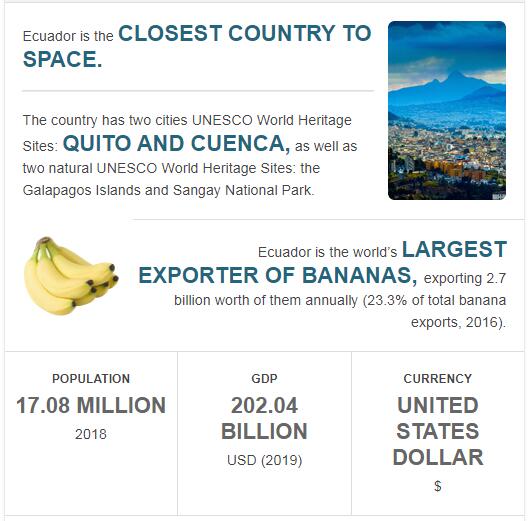The population of Ecuador in 2017 was 16,385,068 people, with the majority living in urban areas. The economy of Ecuador is largely based on services and industry, with a GDP of $117.3 billion and a relatively high per capita income. Ecuador is a member of the United Nations, Organization of American States (OAS), International Monetary Fund (IMF) and World Bank. It has close ties to many countries throughout Latin America as well as the United States and Spain. In terms of politics, it is a unitary presidential republic with President Lenin Moreno as its head of state. The Prime Minister is Guillermo Lasso who leads the Creating Opportunities Party which has been in power since 2017. See militarynous for Ecuador military and defense.
Yearbook 2017
Ecuador. In the second round of the presidential election April 2, Lenín Moreno from the ruling party País Alliance (AP) won with just over 51% of the vote over main opponent Guillermo Lasso from the center-right party CREO. The turnout was high: 83% of the eligible voters. Moreno was installed in office May 24 with promises of combating poverty and a reduced state administration. See ABBREVIATIONFINDER for frequently used acronyms and abbreviations related to as well as country profile of Ecuador.
According to Countryaah.com, some of Moreno’s representatives, former President Rafael Correa’s ministers, remained in government. However, the year was dominated by a growing political conflict between various factions within the AP, which centered around President Moreno and President Correa, respectively. Already in his installation speech, Moreno said that his presidential style would be significantly different from the confrontational and person-centered views that Correa, an outspoken supporter of left-wing leaders Hugo Chávez and Ricardo Maduro of Venezuela, had. He also distanced himself from Correa politically through stated aspirations to reconsider some elements of the leftist politics that Correa conducted during his presidency 2007-17. The crisis worsened when Vice President Jorge Glas, supporter of Correa, in October, accused of corruption in connection with the scandal with the Brazilian construction company Odebrecht was arrested. Moreno then chose to replace him with María Alejandra Acuña. The Correa faction saw the measure as purely political, and the tone was significantly increased with allegations and counter-accusations of treason and corruption. The climax came on October 31 when the party leadership kicked Moreno from the post of party secretary and replaced him with Correa veteran Ricardo Patiño. The crack became so deep that some AP members voted with the opposition in congressional votes where the Correa supporters are twice as many as Moreno’s supporters.
Moreno also announced plans for a referendum on the constitutional change that Correa passed in Congress in 2015 and that by eliminating re-election restrictions would open the way for Correa’s return in 2021.
Moreno received the largest electoral support in the densely populated coastal provinces of Esmeraldas, Manabí and Santa Elena, where Ecuador’s oil industry is concentrated. However, major technical and administrative problems have affected the large Esmeralda refinery, which has reduced the country’s important oil exports. Together with the historically low oil price on the world market and the dominance of Correa supporters in Congress, it was predicted that Moreno will have limited financial space to implement reforms.

August
Ex-President Correa wants to be Vice President
August 18
Former President Rafael Correa, who has been sentenced to prison but is living in exile (see April 7, 2020), says he is a vice presidential candidate in the 2021. Election, according to a statement via Facebook, Correa states that he is running alongside Presidential aspirant Andrés Arauz, who was minister in his government, for the Union for Hope (Unes), an alliance of left-wing parties, indigenous peoples’ groups and trade unions.
Ex-President Bucaram arrested again
12th of August
Former President Abdalá Bucaram has been arrested for the second time in a couple of months, this time on suspicion of links to organized crime. Bucaram was also temporarily arrested on June 3, then due to a corruption investigation into overpricing of medical equipment during the corona pandemic. Bucaram has three sons, all of whom are suspected in several ongoing corruption investigations, and who are all on the run from justice. Bucaram was president for six months from 1996 to 1997, before parliament declared him mentally incapable. He then spent two decades in exile in Panama.